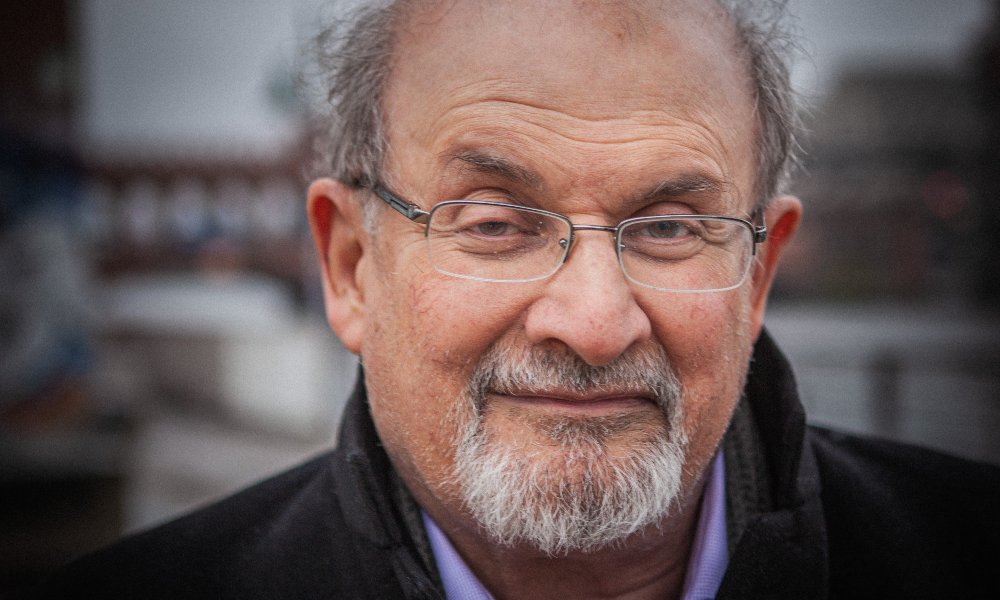When I interviewed Salman Rushdie in hiding, in April of 1992 when he’d been living isolated and under armed guard for more than three years, I thought he was the saddest person I had ever met.
He’d been brought to Washington under deep cover to meet with sympathetic journalists (and presumably some U.S. government authorities) in the hopes of getting some movement on his situation, which was dragging on at increasing cost to him and the British government. He’d gone into hiding in February of 1989, when Iran’s Ayatollah Khomeini issued a fatwa, or religious decree, saying Rushdie’s novel The Satanic Verses insulted Islam and calling on “all valiant Muslims wherever they may be in the world” to kill him “without delay.” His Japanese translator had since been killed and several others attacked.
Rushdie answered our questions in mild tones tinged with exhaustion—about the arcane things he’d learned about fatwas, about the loss of his ordinary London life and the enforced separation from his young son, about what he was working on next and how it was “hard to be interested” in the vast forces that had been unleashed against him, though he’d once been fascinated by the clash of Islam and modernity. He showed emotion only once, flaring up when asked about other countries he might move to: “I want my life back, not some half life in exile.”
When the conversation wound down and we rose to go, he shrugged and said, as if to himself, “Well, back in the box.”
The sudden reemergence of violence against Rushdie, who was stabbed on stage at the Chautauqua literary festival in New York State on Friday, is a reminder not just of the great issues his ordeal represented—freedom of expression, freedom of religion, freedom of conscience—but of that fight’s human cost over decades. It would be several more years after that interview before the threat to Rushdie was judged diminished and he did, in fact, switch countries—moving to New York City, where he became a U.S. citizen and pursued a life of discreet normalcy. Since then, I’d seen him speak in person a handful of times—at Washington’s National Cathedral about his beginnings as a writer; at the Sixth and I Historic Synagogue for a book talk about Quichotte, his 2019 retelling of Don Quixote. Each time, I felt keen pleasure at the contrast with the drained, stymied man I’d met, whose life had appeared functionally over and who had seemed, as I wrote at the time, “half hardened into fable.”
How naïve of me. Fable is still in the lead—a flat, fake, two-dimensional view of life and ideas that turns out to have greater staying power than complex reality. That Rushdie’s pursuers finally caught up with him and grievously harmed him—thank God it’s not worse—is a heartbreaking setback for the forces of freedom and enlightenment. Writers and artists have properly rallied at the violence it does to freedom of expression.
But it’s important to note that Rushdie’s plight and his persecution is also a threat on a very deep level to religious freedom, to the right of people to experience their religion in the way they see fit and to express that experience in art and literature. Lazy descriptions of The Satanic Verses from the beginning often suggested that the novel attacked or satirized Islam—that on some level Rushdie should have known he was causing trouble, even though he didn’t deserve to die for it. But in fact the novel is the opposite of an attack. It’s hilarious in places, but it’s a deep and complex engagement with questions of doubt and faith in the modern world, seen through the experiences of immigrants to the West like Rushdie himself. In a weird way, it’s about exactly the phenomenon whose fury was unleashed against him, the clash of Islam and modernity; there’s even a character in it who’s a lot like the Ayatollah Khomeini. The “satanic verses” of the title are actual early variant texts edited out of the Quran, a historical episode Rushdie learned about while studying medieval Islam at Oxford.
Rushdie, lest we forget, was born a Muslim—hence the specific charge of apostasy, for which the fatwa demanded a death penalty. Not a believer, he was nonetheless creatively engaged with the religion of his birth—a privilege and a right that he in the West, like the rest of us, took for granted. We all make use of that right without thinking twice about it, as well we should: American Jews of all flavors, liberal Christians, modernizing Muslims. All of us should take note: Without the ability to freely interpret our religious sources, our holy books and commentaries, and to publish the results, a vast tradition would cease to exist, everything from Philip Roth to feminist midrash.
Rushdie was an early victim of another baleful trend, described in a 2021 report from the democracy watchdog Freedom House called “Out of Sight, Not Out of Reach: The Global Scale and Scope of Transnational Repression.“ In a world where distances have shrunk and surveillance abilities have expanded, the report notes, the organization counted 735 “physical, direct transnational repression incidents” since 2014 in which exiles or diaspora members were “intimidated or threatened,” or worse, by governments from which they had fled. Back in 1989, when The Satanic Verses was published, India banned the book; Rushdie’s earlier novel Shame, containing a satiric portrait of Benazir Bhutto, had been banned in Pakistan. It didn’t matter that much, since it couldn’t touch him in England, until it could.
Khomeini didn’t need social media to instruct the world’s entire Muslim population to murder Rushdie. He shrank the globe using nothing but old media and the force of his hatred and other people’s. But social media keeps making distances smaller and reaction times faster. We all live in Salman Rushdie’s world now, and it’s getting worse.

